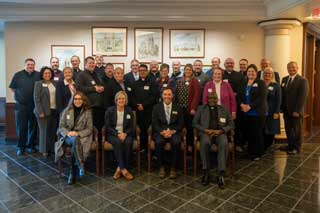Lansing Update: MCC Encourages Action to Feed the Needy & Attend March for Life in Lansing
Posted October 31, 2025
MCC Statement: Michigan Families Should Not Go Hungry Because of Political Gridlock
This week, MCC issued a statement in support of the state Senate’s approval of funding intended to cover the cost of federally funded food assistance scheduled to stop this weekend.

The Senate approved a supplemental spending bill on a bipartisan vote to help cover food assistance payments set to end November 1 due to the federal government shutdown, as the U.S. Congress has not come to an agreement to fund the government since funding authority lapsed on October 1.
An estimated 1.4 million Michiganders receive food assistance under the Supplemental Nutrition Assistance Program (SNAP). Last week, the federal government ordered states to pause planned SNAP payments beginning November 1 due to the shutdown.
The Senate spending bill—Senate Bill 182—would provide approximately $70 million to help provide food to Michiganders who need it most. The bill now needs approval from the state House and then the Governor.
“Michigan families and children should not have to go without food because of unrelated political circumstances outside of their control,” said Paul A. Long, president and CEO of MCC, in the statement. “We urge the state Legislature to continue taking steps to prevent individuals who are among the most vulnerable in our state from going hungry.
“Further, we join with the U.S. Conference of Catholic Bishops in calling on Congress and the federal administration to work in a bipartisan way to ensure lifesaving programs like SNAP are funded and to end the government shutdown as soon as possible.”
The State of Michigan, in a separate move, also announced this week it would send $4.5 million to the Food Bank Council of Michigan to assist in food banks’ efforts to feed needy families.
Michigan March for Life Is Next Week Thursday—Who Are You Inviting?
Next Thursday, November 6 is the Michigan March for Life at the state Capitol in Lansing. Now is the time to make your plans to attend, and to remind family, friends, and parishioners to come and provide a tangible witness to the dignity and sanctity of all human life.
The day begins at 9:30 a.m. with a Mass for Life at St. Mary Cathedral, just steps away from the Capitol. Bishop Earl Boyea of the Diocese of Lansing will preside.
The Mass should conclude in time for the pre-March rally on the Capitol steps beginning at 11 am. The keynote speaker is former Planned Parenthood employee and now pro-life advocate Mayra Rodriguez, whose story was previously featured in Lansing Update.
Other speakers include leaders from the Knights of Columbus, Right to Life of Michigan, and March for Life. The march itself will then begin at noon, concluding at 1 p.m.
Information about parking, as well as maps, packets for bus leaders and riders, and more, can be found at the Michigan March for Life website.
Those looking for a ride to the March can find a list of registered buses and where they are leaving from here.
Legislation Resurfaces to Make Drinking Water More Affordable for Needy
Access to water would be more affordable for some of the state’s lower-income earners under legislation supported by MCC and considered in a Senate committee this week.
As drinking water is a basic human need, MCC supports policy that makes access to it more affordable for individuals who need assistance.
The legislation would set up a state Low-Income Water Residential Affordability Program, which would ensure water customers with a household income of up to 200% of the federal poverty level do not pay more than 3% of their household income on a water bill.
The bills would also prevent water shutoffs for customers, which could only happen after certain conditions are met, according to an analysis of the bill package.
The Senate Housing and Human Services Committee took testimony only on Senate Bills 248–256, which are similar to legislation introduced in the previous session, which MCC also supported.
MCC Co-Hosts Conversation on Catholic Approach to Criminal Justice Policy
Individuals responsible for and otherwise involved in the state’s criminal justice system came together for an event co-hosted by MCC intended to promote the building up of a more just and humane criminal justice system.
MCC, along with the Diocese of Lansing and the Lumen Christi Institute, organized an evening of dialogue at St. Mary Cathedral in Lansing titled, “Doing Justice and Loving Mercy: A Michigan Conversation on Criminal Justice.”
Beginning with Mass celebrated by Bishop Earl Boyea of the Diocese of Lansing, the event featured a discussion involving State Senator Sylvia Santana (D-Detroit), Judge Phillip Green of the U.S. District Court of the Western District of Michigan, returning citizen Tony Gant, Sarita Martinez (a family member of a crime victim), and Bishop Boyea.
The event was organized as part of a series of nationwide dialogues initiated in partnership with the Catholic Criminal Justice Reform Network.
Pastors of School Parishes Invited to Day of Formation at MCC
MCC this week hosted clergy from all seven arch/dioceses who serve parishes with a Catholic school for a day of formation focused on those parish leaders who also oversee schools.

The daylong event touched on financial management, faith formation of faculty/staff, the role of faith formation programs, and relationships between pastors, principals, and superintendents.
The discussions were led by a panel that included Margaret Erich, retired superintendent for the Diocese of Kalamazoo; Dr. Cormac Lynn, superintendent for the Diocese of Saginaw; Fr. Ryan Riley, pastor of St. Martha Parish in Okemos; and Mary Kay Yonker, principal of Sacred Heart Academy in Mt. Pleasant.
Former superintendent for the Diocese of Grand Rapids, David Faber, helped facilitate the dialogue. MCC’s Education Committee, comprised of the superintendents for each of Michigan’s dioceses, spearheaded the event.
Lansing Area Catholic Priest Gives Invocation Before House Session
Fr. Bob Bacik, pastor of St. Gerard Catholic Church near Lansing, was invited to give the official invocation before the start of session for the state House of Representatives on Thursday.
In his prayer, Fr. Bacik invoked the intercession of Blessed Solanus Casey of Detroit as well as Venerable Bishop Baraga of the Upper Peninsula. According to the House journal for session that day, Fr. Bacik offered the following prayer:
Almighty and merciful God, You reign over all creation and guide the hearts of those who serve the common good. We thank You for those who offer their gifts and energy in public service, and for the many unseen sacrifices that make their work possible.
Bless the members and staff of this House of Representatives, and their families and loved ones who share in the weight of their service. Grant them wisdom and courage in their deliberations. Inspire them to uphold the dignity of every person, to protect the poor and vulnerable, to defend freedom of conscience and faith, to honor the dignity of work, and to care for the land and waters that make Michigan such a blessed home.
May this House be a place where dialogue replaces division, where conviction is joined with humility, and where the good of all Michiganders remains the measure of every choice. Renew in all of us a spirit of unity and hope for this nation and this state.
In the tradition of my Catholic faith, I offer this prayer and blessing through the intercession of Blessed Solanus Casey of Detroit, humble doorkeeper and friend of the poor, who taught us that gratitude opens the door to grace; the Venerable Bishop Frederic Baraga of Michigan’s great north, missionary and bridge-builder who united peoples through faith, language, and love; and Sr. Mary Theresa Dudzik, servant of the poor and immigrant, whose compassion helped shape our communities.
May their example remind us that holiness is often found in humble service, and that leadership begins with listening. In the name of the Father, and of the Son, and of the Holy Spirit. Amen.
No Need to Be Scared of Halloween
Memento mori. Remember death. It is not difficult to do around this time of year, given the Halloween decorations. Yet the true meaning—or rather, the original meaning of Halloween—leans right into memento mori, but not in the same way as the secular culture has taken the holiday.
For Christians, there is no need to dispense of celebrating the 31st of October altogether. For Halloween—or All Hallows’ Eve—is merely the vigil of the great feast of All Saints, followed by the commemoration of All Souls.
With every great solemnity in the Church, a vigil is kept in anticipation, thus All Hallows’ Eve, or Halloween, is the beginning of celebrating All Saints, the Church Triumphant—a feast dedicated to all holy men and women of God who now intercede for us from Heaven, whether officially canonized or not. It is a day to celebrate in hope and anticipation of our eventual arrival there—a celebration so great it begins the previous day.
Following All Saints Day, the Church turns its attention to its suffering members in purgatory on All Souls Day. It is here we most often think of our loved ones who have gone before us, praying for their souls with the hope that they too can reach heaven after being fully purified from all earthly attachments.
While death and the end-of-life is scary for some—perhaps why Halloween is celebrated the way it is now—the three days of “Allhallowtide” help call our attention back to our inevitable death and final judgment.
By contemplating the heavenly glory the saints now enjoy, and remembering to pray for those souls who have not reached it, we too are invited to memento mori—remember death—so as to live in preparation of it, knowing by faith and hope what lies on the other side.

